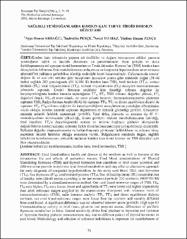Sağlıklı yenidoğanlarda kordon kanı tsh ve tiroid hormon düzeyleri
Özet
Kordon kanı intrauterin yaşama ait özellikler ve doğum travmasının etkileri yanı sıra yenidoğanın sağlık ve hastalık durumunu da yansıtmaktadır. Fetal gelişim ve doku farklılaşmasında rol oynayan tiroid hormonları ve Tiroid Stimulan Hormon’un (TSH) kordon kanı düzeylerinin bilinmesi fetal metabolizmanın anlaşılması ve konjenital hipotiroidizm erken tanısına alternatif bir yaklaşım getirebilme olasılığı nedeniyle önem kazanmaktadır. Çalışmamızda normal doğum ile ve son adet tarihine göre hesaplanan gestasyon yaşına göre miadında doğan (38-40 hafta) sağlıklı 202 yenidoğanda (98 K/104 E) kordon kanı TSH, total tiroksin (TT4), serbest tiroksin (fT4), total triiyodotironin (TT3), serbest triiyodotironin (fT3) düzeyleri kemiluminesans yöntemle saptandı. Üretici firmanın erişkinler için önerdiği referans değerler ile karşılaştırıldığında kordon kanında saptadığımız TT4, FT4, TSH referans değerleri yüksek, FT3 değerleri düşük, TT3 alt sınırı düşük, üst sınırı yüksek bulundu. İmmunoluminometrik yöntemle saptanan TSH, Radyo İmmun Analiz (RIA) ile saptanan TT3, TT4 ve direkt equilibrium diyaliz ile saptanan FT3, FT4 referans değerler ile karşılaştırıldığında sonuçlarımızın yenidoğan döneminden düşük olduğu, kordon kanında saptanan değerlerden de farklılık gösterdiği görüldü. Cinsiyetler arasında anlamlı farklılık saptanmadı (p>0.05). Fetal doku, plasenta ve uterusta tip III 5’- monodeiyodinaz aktivitesinin yüksekliği, fetusta periferik tiroksin metabolizmasının farklılığı, fetal hipofizin TT4’e duyarlılığındaki azalma ve tiroksin bağlayıcı globulin düzeyindeki değişikliklerin kordon kanında saptanan farklı tiroid hormon patemine yol açabileceği düşünüldü. Referans değerler oluşturulmasında ve kullanılmasında yöntemsel farklılıkların ve referans birey seçiminin önemli faktörler olduğu sonucuna varıldı. Bulgularımız miadında doğan, sağlıklı bebeklerin kemiluminesans yöntemle saptanan kordon kanı tiroid hormon ve TSH düzeyleri için fikir oluşturmaktadır. Cord blood reflects health and disease of the newborn as well as features of the intrauterine life and effects of parturition trauma. Cord blood concentrations of Thyroid Stimulating Hormone (TSH) and thyroid hormones that contribute to fetal tissue accretion and differentiation provide insight into fetal thyroid metabolism and may offer an alternative approach for early diagnosis of congenital hypothyroidism. In this study cord blood TSH, total thyroxine (TT4), free thyroxine (fT4), total triiodothyronine (TT3), free triiodothyronine (fT3) concentrations of healthy, term (38-40 weeks according to the last menstrual period) 202 newborns (98 F/104 M) were determined by a chemiluminescence method. Our cord blood reference ranges of TSH, TT4, fT4 were higher, 1T3 were lower, lower and upper limits of TT3 were lower and higher respectively than adult reference ranges supplied by the manufacturer. Compared with reference limits of immunolumiometric (TSH), radio immune analytic (TT4, TT3) and direct equilibrium dialysis methods, our cord blood reference ranges were lower than the newborn and variably different from cord blood. A significant difference was not observed between sexes (p>0.05). High type III 5’monodeiodinase activity in fetal tissue, placenta and pregnant uterus, differences of periferic thyroxine metabolism in fetus, limited sensitivity of the fetal pituitary to thyroxine and variation of thyroxine binding globulin concentrations may lead to different pattern of thyroid hormones in cord blood. Methodology and selection of reference individuals is important for establishment of eference ranges. Our results may provide insight to healthy term newborns’ cord blood TSH and thyroid hormone concentrations. Cord blood reflects health and disease of the newb orn as well as features of the intrauterine life and effe cts of partu rition traum a. Cord blood co nce ntrations of Thyroid Stimulating Horm one (TSH) and thyroid horm ones that contribute to fetal tissue accretion and different iation provide insight into fetal thyroid metabolism and may offer an alternative approach for ea rly diagnosis of congenital hypoth yroidism. İn this study cord blood TSH, total thyroxine (TT4 ) , free thyroxine (İT4) , total triiodoth yronin e (TT)), free triiodothyronine (İT3) concentrations of health y, term (38-40 wee ks according to the last menstru al period) 202 newborns (98 F/l04 M) were determined by a chemiluminescence method. Our cord blood referenc e ranges of TSH, TT4, İT4 were higher, İT) were lower, lower and upp er limits of TT3 were lower and higher respectively than adult reference ranges supplied by the manufacturer. Comp ared with reference limits of immun olumiometric (TS H), radio immun e analytic (TT 4, TT3) and direct equilibrium dialysis methods, our cord blood reference ranges were lower than the newborn and variably different from cord blood . A significant difference was not observed between sexes (p>0.05). High type İİİ 5'monodeiodin ase activity in fetal tissue, placenta and preg nant uteru s, differences of periferic thyro xine metabolism in fetu s, limited sensitivity of the fetal pituitary to thyroxine and variation of thyroxine bindin g globulin concentrations may lead to different pattern of thyroid horm ones in cord blood . Me thodology and selection of refe rence individuals is important for estab lishment of reference ranges. Our results may provide insight to healthy term newborns' cord blood TSH and thyroid hormone concentrations.
Kaynak
Afyon Kocatepe Üniversitesi, Kocatepe Tıp DergisiCilt
2Sayı
1Bağlantı
http://hdl.handle.net/11630/1585Koleksiyonlar
- Makaleler [452]



















